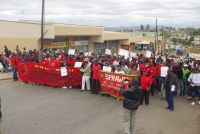October 2010 -- COSATU has welcomed the great leap forward and giant step taken by workers of Swaziland in resolving to unite by merging the two federations; Swaziland Federation of Trade Unions (SFTU) and Swaziland Federation of Labour (SFL), together with the independent Swaziland National Association of Teachers (SNAT) to form a new giant federation. It marks the deepening and strengthening of the most progressive, militant and revolutionary traditions constantly being evolved by the working class movement the world over.
This breakthrough comes after years of hard work, dedication and sacrifice behind the scenes to diagnose, confront and clear all obstacles in the way of unity. Frank and brutally honest engagements, painful and demanding persuasions, as well as engaging feedbacks to members are all the hallmarks of a transparent, democratic and accountable process characterised by traditions of worker control. Once this part of the journey has been travelled with success, the nearing horizons only serve to inspire the march on.






